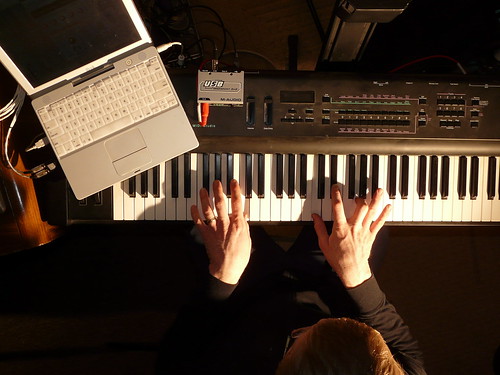Computers and computer software can have as much or even more longevity than traditional music hardware – that is, if elements like copy protection don’t intervene first. As a postscript to the discussion last week, prompted by a new software release for the Apple II, here’s a report from our friend Bill Van Loo. He was able to make a productive little workstation out of an old iBook (500Mhz), with access to Reaktor Session instruments and an Apple electric piano now gone.
Bill has been doing a project a week all year, working towards the goal of 52 projects at the end of 2010, so consider this an excuse to peek into his studio and get some inspiration and ideas for projects:
What’s interesting to me is how productive the results were. But that means there’s a real failure caused by arcane copy protection. And much as we complain about dongles, the dongle worked – it was software/online challenge-response that was the failure point. (Before dongle advocates at developers rejoice, uh, guys, if you add online activation to your dongle as some of you have recently done, you’ve just killed your advantage.)
I don’t think it’s realistic for developers to always provide 100% backwards compatibility. But it’s clear that developers aren’t doing a great job of gracefully bringing products to the end of their life cycle. If a product is to be discontinued, why not do what Propellerhead did with their popular ReBirth instrument and provide it free? Open source licensing isn’t always the answer, as it adds additional legal work and presumes that someone wants all this old source code, which very often, they don’t. But at least by providing a free download, perhaps a very specific license that makes it free to trade the binary file, people don’t lose access to software they use in their music.
Bill’s comments, plus a link to the full story – well worth reading if you’re considering doing something similar yourself:
As it happens, I went through my own version of this (resurrecting old technology to get usable instruments back) and documented it on my blog, as part of my ongoing “52 things” (a “project-a-week” series).
A few years ago, I replaced my trusty titanium PowerBook with a shiny new Intel MacBook. That brought lots of increased power, but it also meant losing some things I really liked as a result of moving from the PowerPC-based PowerBook to the Intel-based MacBook. My favorite Rhodes electric piano sound came from Logic’s EVP73 plugin, which didn’t run on Intel Macs. One of my other favorite sound sources was Reaktor Session, which I loved for its Vierring ensemble, among others.
What it came down to, for me, is that it was worth getting back those capabilities. I learned, along the way, that the dongle-based copy protection schemes (much as I disliked them at the time) of Logic and Max/MSP allowed me to get them up and running extremely quickly.
In contrast to dongle-based copy protection, the challenge/response authorization system of Native Instruments actually made it much more difficult (relatively speaking) to get Reaktor Session installed & going. NI’s customer support got me set up quickly, but having to rely on that to get software working makes it more fragile in terms of dependencies.
5/52: iBook instrument station
